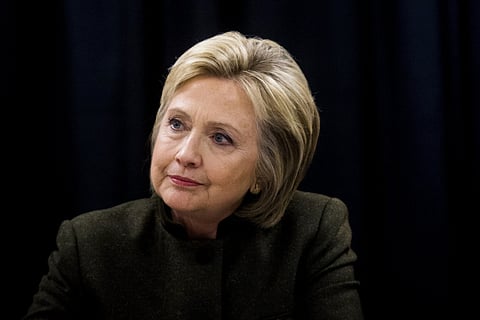Hillary’s problem? Too much prose
If the Democrat’s prosaic approach is a function of her character, and thus hard to change, she’s also making unforced errors

At last week’s Democratic debate in New Hampshire, Hillary Clinton repeated her central criticism of her rival, Senator Bernie Sanders: He’s an unrealistic, ineffective utopian. “I am not going to make promises I can’t keep,” she said, implying that Sanders had done exactly that. “I am not going to talk about big ideas like single-payer [health insurance] and then not level with people about how much it will cost.”
“You campaign in poetry,” she has often said, quoting the late New York governor Mario Cuomo. “You govern in prose.”
Hillary had used the same line eight years ago, when she was running for the nomination against Barack Obama. It didn’t work. Will it play any better against Sanders?
Once considered the Democrats’ inevitable nominee, Hillary is facing yet another unexpectedly strong challenge from an upstart in part because she ignores the first half of Cuomo’s advice: She campaigns almost entirely in prose. Her speeches are heavy with lists of medium-sized policy initiatives, but light on soaring dreams. Asked at the debate what her top priority would be, she listed no fewer than eight items, beginning with solar panels, lower prescription drug costs and paid family leave.
Meanwhile, Sanders has been thrilling progressives with an expansive (and, yes, utopian) vision of a nonviolent “political revolution” in which millions of voters would march on Congress and compel Republicans to bow to their will, enact European-style health insurance and outlaw big campaign donations.
The contrast between prose and poetry helps explain the yawning age gap among Democratic voters in Iowa last week: Sanders won 84 per cent of voters under 30, a number even Hillary called “amazing”. Hillary won 69 per cent of voters over the age of 65.
Painful moment
It’s no accident that Clinton talks mostly about practical, incremental measures for reform. That’s who she is. But if Clinton’s prosaic approach is a function of her character, and thus hard to change, she’s also making unforced errors.
Her most painful moment last week came when she was asked whether it had been wise to accept $675,000 (Dh2.48 million) in speaking fees from the Goldman Sachs investment bank. “That’s what they offered,” she said with a dismissive shrug. “They’re not giving me very much money now.”
What kind of politician wouldn’t have paused to consider, after all the anger about Wall Street that voters have expressed, that those speaking fees might not look good? Hillary is stuck in the classic, awkward position of most Democratic candidates not named Sanders; she has raised millions from donors who are connected to Wall Street and other interests that most of her supporters don’t like.
She’s campaigning against the unlimited money that flows through super PACs, even though she has authorised a super Political Action Committee to raise money on her behalf. Sanders has no such problem; he trumpets the fact that, unlike every other candidate, he doesn’t have a super PAC at all.
Hillary has enormous strengths as a candidate: intelligence, experience and more expertise in foreign policy than anyone else in the race. She’s unlikely to win in today’s New Hampshire primary, but that needn’t stop her from winning the nomination. She’s still the Democrats’ national front-runner. But if she faces a deficit of enthusiasm among voters in autumn, she’ll have only herself to blame.
— Los Angeles Times
Doyle McManus is Washington columnist at the Los Angeles Times.



